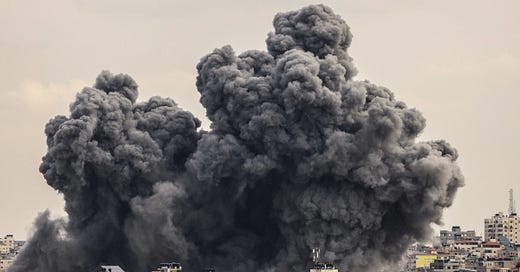Given the torrent of news and commentary since Hamas’s attack on Israel and the ongoing Israeli response, I have searched for context that the urgency of coverage in today’s media universe cannot possibly provide.
There are those – Jews and others – who want Israel to reflect the best of our attitudes in humanitarian, social, and political matters, which in recent years we believe it has not.
I found two books helpful, not about this war itself – which by any measure is an unmitigated catastrophe – but about my sense of the widespread feeling among Jews in the American diaspora, many of whom have emotional or family ties to Israel. This is a dreadful period and imagining how matters might be resolved defies optimism.
Dara Horn’s People Love Dead Jews published in 2021 explains the historical phenomenon in which Jewish victims are widely mourned but otherwise Jews are considered, well, problematic. We are grieving now for those massacred and increasingly worry about the consequences of the fury against Hamas in Gaza and the impact on the Palestinians who live there.
Martha Hodes’s My Hijacking: A Personal History of Forgetting and Remembering describes her experience as a twelve-year-old Jewish child returning to the United States after a summer in Israel in 1970 with her older sister, when their plane was hijacked by Palestinian militants from the Popular Front for the Liberation of Palestine (PFLP). She spent six days and nights in the Jordanian desert before being released. Four planes were involved and other passengers were kept longer than Hodes.
Details of the hundreds of hostages being held in Gaza are different from her story – the PFLP’s objectives were mainly political. They did not physically abuse their captives. But, fifty years later Hodes explains that being a hostage is a trauma that is lasting. And as a child, Hodes writes, she knew very little about why Palestinians would use piracy and civilian seizures as a means of protest.
The hostages now have had decades to absorb the sources of Palestinian rage and they are in mortal danger.
**************************************
From the outset of Israel’s seventy-fifth anniversary year in 2023, I thought that something might well make this year a test – definitely not a celebration. With focus on the diplomatic activity in the region after the Abraham Accords, culminating in the speculation about détente between Saudi Arabia and Israel, and on the Israeli Supreme Court’s impending decision on the weakening of its power, traditional security concerns seemed at an ebb.
Then came October 7. No need to describe what happened here.
The world is still in shock at the success of Hamas’s venemous attack, the Israeli weaknesses it revealed, and the scale of violence and civilian casualties in Israel’s response in Gaza so far. With each passing day, the question looms larger: Will this retaliation overwhelm the righteousness that was its justification with no prospect of an ending?
Dara Horn’s recent op-ed in The New York Times, headlined “Why Jews Cannot Stop Shaking Now,” was powerful as a meditation on the way so many Jews seem to be feeling. She observed that when you are Jewish and see the scale and brutality of the Hamas attacks, you doubtless recognize the terrifying historical precedents. This is almost certainly true, regardless of what your feelings about Israel’s’s politics and policies were the day before the attacks.
In in our Manhattan apartment building, an older man, a rabbi whose elevator greetings were invariably cheerful, said this is as “low’ in spirit as he has ever been.
The Hamas attacks – far worse than Kristallnacht in the number of Jews killed – and the resulting mayhem (which technology has made unavoidably visible) has an impact, even for those of us inured by age and background to human conflict. How might the Holocaust have been different if every cruelty had been on the internet? After three weeks, footage of rampant destruction is now coming mainly from Gaza.
The Jewish mantra since World War II has been “never again,” and embedded in the DNA of Israelis from its founding is a commitment to that goal as the nation has endured wars and incessant tension. For better or worse, “never again” is now on full display for all the world to judge.
Martha Hodes kept a diary of her days as a hostage, and when she read it in researching her book, she discovered how as a child she had the instinct to deflect the anxiety she felt but was so clearly there. In September, before the war, Hodes (now a professor at New York University) and the historian Stacy Schiff discussed her book in an absorbing conversation available here. The hostages now will almost certainly have very different memories.
How antisemitism and anti-Zionism intersect is at bottom the reason for, among other things, the disputes roiling American campuses and the surge in reported antisemitic incidents. But Jewish people everywhere represent a complete cross-section of humanity, from the most secular to the most ultra-orthodox in religious beliefs, from the disgraceful Harvey Weinstein and Jeffrey Epstein to Leonard Bernstein and Stephen Sondheim, Jonas Salk and Albert Einstein and in Israel from founder David Ben-Gurion to Bibi Netanyahu surounded by bigots in lofty roles..
What we all have in common is that we are Jewish and that antisemitism, rising and falling, will always exist as a fact of life. Being Jewish means accepting the realities of historical precedent and knowing that emnities from the distant past will be revived by the politics of the present.







Thanks.
What has happened is that so much agony from Gaza is in the footage being shown that public awareness of what Hamas did is being overwhelmed.
For now Israel is losing even if it is winning.
Takes one to know and appreciate one and one with a memory for wisdom.